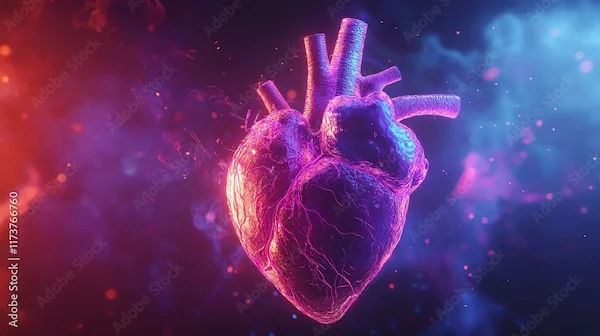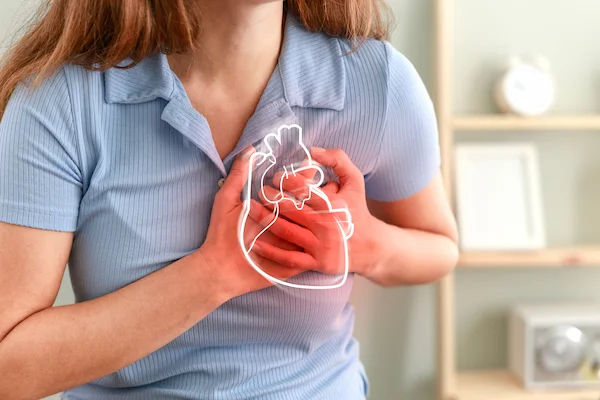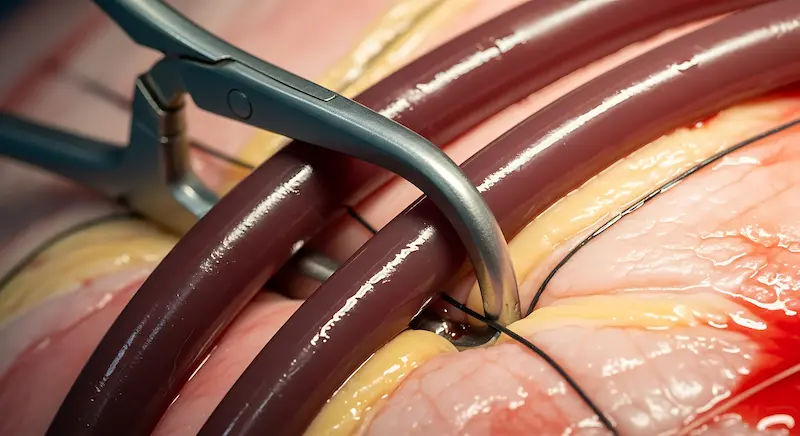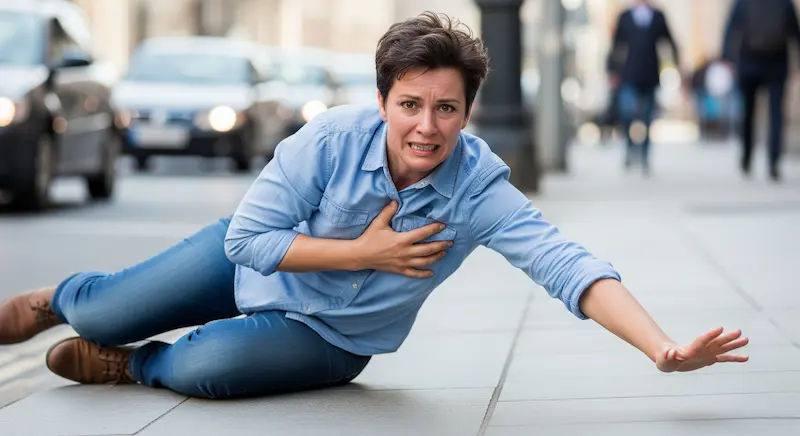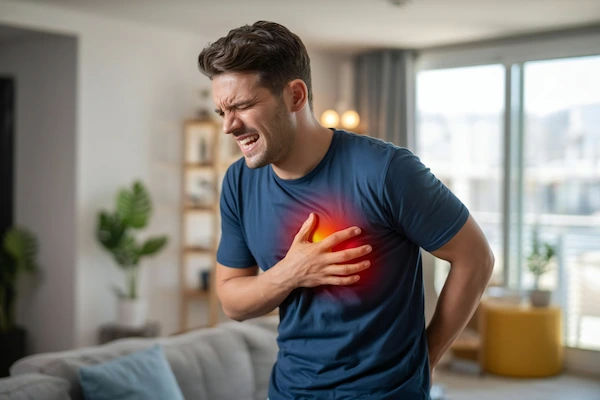Signs of Heart Attack to Recognise Early
Identify early signs of a heart attack such as chest pain, shortness of breath, and fatigue. Early recognition can save lives—know when to seek immediate medical help.

Written by Dr. Rohinipriyanka Pondugula
Reviewed by Dr. Md Yusuf Shareef MBBS
Last updated on 13th Jan, 2026
_2.webp?tr=q-80,f-webp,w-350,dpr-2,c-at_max 700w)
A heart attack is a medical emergency that requires immediate attention. Recognising the early signs can save lives by ensuring timely treatment. Many people associate heart attacks with sudden, intense chest pain, but symptoms can be subtle and vary between individuals. Understanding these signs can help you or your loved ones seek help before it’s too late.
What is a Heart Attack?
A heart attack (medically known as a myocardial infarction) occurs when the blood flow to a part of the heart is blocked, usually due to a blood clot. Without oxygen-rich blood, the heart muscle begins to die. The longer the blockage remains untreated, the greater the damage to the heart.
Common Signs of a Heart Attack
While chest pain is the most well-known symptom, heart attacks can present in different ways, especially in women and older adults. Here are the key signs to watch for:
1. Chest Pain or Discomfort
A squeezing, pressure, or heaviness in the centre or left side of the chest.
The pain may last for several minutes or come and go.
Some describe it as an "elephant sitting on the chest."
2. Pain in Other Areas
Pain may spread to the arms (especially the left arm), jaw, neck, back, or stomach.
Some people experience only jaw or arm pain without chest discomfort.
3. Shortness of Breath
Difficulty breathing, even without chest pain.
May occur before or along with chest discomfort.
4. Cold Sweat, Nausea, or Dizziness
Sudden cold sweats, nausea, vomiting, or lightheadedness can signal a heart attack.
Some people mistake these symptoms for indigestion or the flu.
5. Fatigue or Weakness
Unexplained extreme tiredness, especially in women.
Feeling unusually weak, even without physical exertion.
6. Irregular Heartbeat or Palpitations
A racing, fluttering, or irregular heartbeat may occur before or during a heart attack.
Less Common Symptoms (Especially in Women & Diabetics)
Stomach pain, heartburn, or indigestion-like discomfort.
Sudden anxiety or a feeling of doom.
What to Do If You Suspect a Heart Attack?
If you or someone around you experiences these symptoms:
1. Call Emergency Services Immediately (Dial 112 or your local emergency number).
Do not ignore symptoms or wait to see if they go away.
Every minute counts—early treatment improves survival chances.
2. Chew an Aspirin (if available and not allergic).
Aspirin helps thin the blood and may reduce heart damage.
3. Stay Calm & Rest.
Sit or lie down while waiting for help.
Avoid any physical activity.
Consult Top Specialists
Who is at Risk?
Certain factors increase the risk of a heart attack:
Age (Men over 45, Women over 55)
High blood pressure, high cholesterol, or diabetes
Smoking or excessive alcohol use
Obesity & lack of exercise
Family history of heart disease
Chronic stress or poor diet
How to Reduce Your Risk?
Preventing a heart attack involves healthy lifestyle choices:
1. Eat a Heart-Healthy Diet
More fruits, vegetables, whole grains, and lean proteins.
Less salt, sugar, fried foods, and processed meats.
2. Exercise Regularly
Aim for 30 minutes of moderate activity (walking, cycling) most days.
3. Quit Smoking & Limit Alcohol
Smoking damages blood vessels—quitting reduces heart attack risk significantly.
4. Manage Stress
Practice deep breathing, meditation, or yoga to lower stress levels.
5. Monitor Health Conditions
Keep blood pressure, cholesterol, and diabetes under control with regular check-ups.
When to See a Doctor?
If you have risk factors or experience unexplained chest discomfort, fatigue, or shortness of breath, consult a doctor. Early detection of heart disease can prevent a heart attack.
Book a Heart Health Check-Up Today
If you're concerned about your heart health, Apollo 24|7 offers comprehensive heart check-ups and consultations with cardiologists. Early screening can save your life!
Conclusion
Heart attacks don’t always happen like in the movies—they can start with mild symptoms. Listen to your body and act fast if something feels wrong. Share this information with your loved ones—it could save a life!
Consult Top Specialists
Consult Top Specialists

Dr. Tripti Deb
Cardiologist
40 Years • MBBS, MD, DM, FACC, FESC
Hyderabad
Apollo Hospitals Jubilee Hills, Hyderabad

Dr. Zulkarnain
General Physician
2 Years • MBBS, PGDM, FFM
Bengaluru
PRESTIGE SHANTHINIKETAN - SOCIETY CLINIC, Bengaluru

Dr. E Prabhakar Sastry
General Physician/ Internal Medicine Specialist
40 Years • MD(Internal Medicine)
Manikonda Jagir
Apollo Clinic, Manikonda, Manikonda Jagir
(175+ Patients)
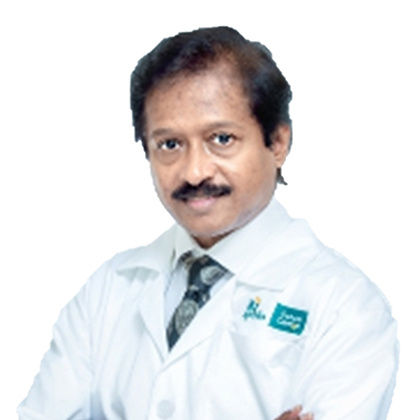
Dr. Rakesh Gopal
Cardiologist
22 Years • “ Trained in Trans Aortic Valve Implantation ( TAVI ) from Mehmet Akif Ersoy Hospital Istanbul, Turkey “ & MD (General Medicine), FRCP (Glasglow)DNB( Cardiology), FESC, HICR Cert (Harvard University, USA), Angioplasty Training from Washington Adventist Hospital USA, Asan Medical Centre, Seoul Korea, Board certified in Cardio Oncology, ICOS- USA
Chennai
Apollo Hospitals Greams Road, Chennai
(100+ Patients)
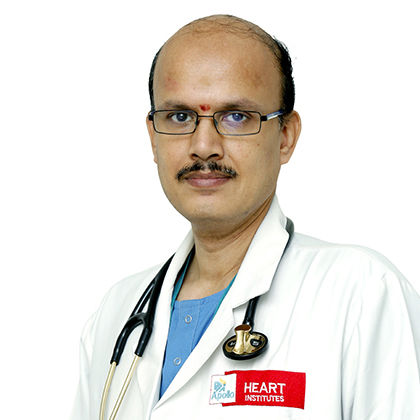
Dr. Srinivasan K N
Cardiologist
11 Years • MD, DNB (Cardio)
Chennai
Apollo Hospitals Greams Road, Chennai
(200+ Patients)
